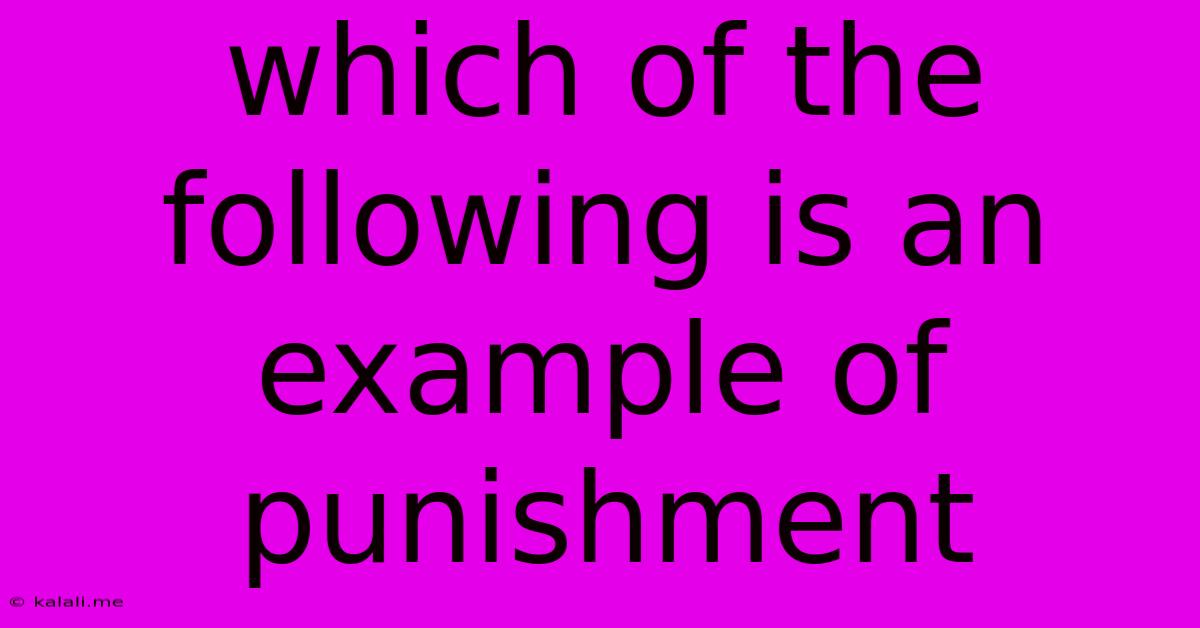Which Of The Following Is An Example Of Punishment
Kalali
Jun 15, 2025 · 3 min read

Table of Contents
Which of the Following is an Example of Punishment? Understanding Punishment and Its Types
This article explores the concept of punishment and provides examples to help you understand its various forms. We'll delve into the different types of punishment and how they differ from other disciplinary actions. Understanding punishment is crucial in various fields, from psychology and sociology to law and education.
What is Punishment?
Punishment, in its simplest form, is a consequence intended to decrease the likelihood of a specific behavior recurring. It involves administering a negative stimulus or removing a positive one following an undesirable action. The key element is the reduction of future behavior. This differs from other consequences, such as warnings or reprimands, which may not always effectively deter future actions. This also distinguishes it from corrective measures which aim to teach a more desirable behavior.
Types of Punishment and Examples
There are several ways to categorize punishment. Here are some common types with illustrative examples:
1. Positive Punishment (Punishment by Application): This involves adding an aversive stimulus to decrease the likelihood of a behavior.
- Example 1: A child misbehaves and is grounded (adding restriction).
- Example 2: An employee consistently arrives late and receives a written warning (adding a negative consequence).
- Example 3: A dog jumps on the counter and is sprayed with water (adding an unpleasant stimulus).
2. Negative Punishment (Punishment by Removal): This involves taking away a desirable stimulus to decrease the likelihood of a behavior.
- Example 1: A teenager breaks curfew and loses their driving privileges (removing a privilege).
- Example 2: An employee consistently misses deadlines and has their bonus revoked (removing a reward).
- Example 3: A child throws a tantrum and has their favorite toy taken away (removing a positive reinforcement).
Distinguishing Punishment from Other Consequences
It's important to differentiate punishment from other consequences. For example:
- Corrective Feedback: This focuses on teaching the correct behavior rather than simply punishing the wrong one. It provides guidance and instruction.
- Natural Consequences: These are the direct results of a behavior, without external intervention. For example, if a child doesn't pack their lunch, they will be hungry at school.
- Logical Consequences: These are consequences directly related to the misbehavior, designed to teach responsibility. For example, if a child makes a mess, they must clean it up.
Effective Punishment vs. Ineffective Punishment
Effective punishment is timely, consistent, and clearly linked to the undesirable behavior. Ineffective punishment is often arbitrary, inconsistent, or excessively harsh, leading to resentment and negative emotional consequences. The focus should always be on modifying behavior constructively.
Conclusion
Understanding the different types of punishment and how they work is crucial for effective behavior modification. While punishment can be a necessary tool, its application requires careful consideration and should always be used responsibly and ethically. Remember that the most effective approaches often involve a combination of positive reinforcement and constructive feedback, focusing on building desired behaviors rather than solely suppressing undesired ones. The goal is always to guide individuals toward positive change and responsible behavior.
Latest Posts
Latest Posts
-
Which Of The Following Has The Highest Electronegativity
Jun 15, 2025
-
35 Of What Number Is 91
Jun 15, 2025
-
How Do You Spell 18 In Words
Jun 15, 2025
-
Bliss Was It In That Dawn To Be Alive
Jun 15, 2025
-
The Magnetic Field Is Strongest When
Jun 15, 2025
Related Post
Thank you for visiting our website which covers about Which Of The Following Is An Example Of Punishment . We hope the information provided has been useful to you. Feel free to contact us if you have any questions or need further assistance. See you next time and don't miss to bookmark.